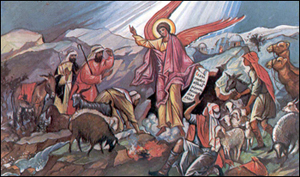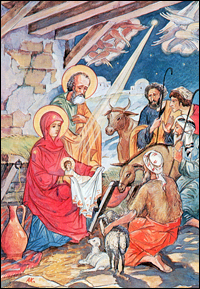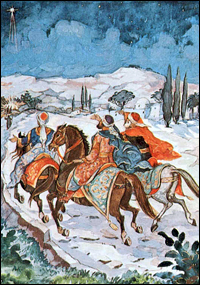A historical account of the Nativity
In the history of mankind there is no greater or more
joyous event than the coming of the Son of God into the
world and His incarnation. It is a manifestation of the
boundless love of God the Father, Who “so loved the world
that He gave up His Son for it, in order that all who
believe in Him shall not perish, but shall have life
eternal.”
The incarnation of the Son of God from the Virgin Mary
radically changed the world for the better: it provided
people with a new way of thinking, ennobled their mores,
set world events upon a new course. It poured into the
decrepit human organism a stream of Divine life and thus
endowed people with eternal life. For these reasons the
incarnation of the Son of God has occupied a central
place among world events and serves as the focal point of
chronology – time is counted before and after the
Nativity of Christ.
Before Jesus Christ’s nativity there was universal
expectation of a Saviour. The Jews awaited His coming on
the basis of prophecies; the pagans, suffering from
disbelief and a general laxity of morals, also eagerly
awaited an Ameliorator of human society. All the
prophecies concerning the time of the Son of God’s
incarnation had come to pass. Patriarch Jacob had
foretold that the Saviour would come when the scepter
would depart from Judah (Genesis 49:10). The holy prophet
Daniel foretold that the Kingdom of Messiah would come in
seventy times seven years (490 years) after the issuance
of the commandment to restore Jerusalem, during the
period of the mighty pagan kingdom that would be strong
as iron (Dan. 9:24-27).
And so it happened. By the end of the prophesied period
of time, Judea came under the dominion of the mighty
Roman Empire, while the scepter was transferred from
Judah to Christ. Since the people, having abandoned God,
began to idolize earthly goods, wealth, and glory, the
Son of God rejected these worldly idols and came into the
world in the humblest of circumstances.
The events of the Nativity are described by two
Evangelists – the apostles Matthew (from among the 12)
and Luke (from among the 70 disciples). Since the
Evangelist Matthew wrote his Gospel for the Jews, he set
himself the task to prove that the Messiah came from the
forefathers Adam and King David, as it had been foretold
by the prophets. For this reason the Evangelist Matthew
begins his account of the Nativity of Christ with a
genealogy.
Knowing that Jesus was not the son of Joseph, the
evangelist does not say that Joseph begat Jesus, but says
that Jacob begat Joseph, the husband of Mary, from Whom
was born Jesus, Who is called Christ. But why does he
present the genealogy of Joseph and not of Mary? The fact
is that the Jews were not accustomed to record their
genealogies along the female line. However, the law
demanded that they obligatorily take a wife from the same
tribe as the one to which the husband belonged, and so
the evangelist, without departing from custom, presented
the genealogy of Joseph, thus showing that Joseph’s wife
Mary and, consequently, the Jesus Who was born from Her,
come from the same tribe of Judah and house of David.
Having been told by the Archangel Gabriel that She was
chosen to become the Mother of the Messiah, the Holy
Virgin went off to see Elizabeth while still being only
affianced to Joseph. Three months already passed after
the Angel’s tidings. Joseph, not being privy to this
mystery, noticed Her condition, and though the external
appearance could give rise to thoughts of the bride’s
unfaithfulness, and though he could publicly denounce Her
and subject Her to the strict punishment instituted by
the law of Moses, in his kindness he did not wish to
employ such a drastic measure. After much wavering, he
decided to let his bride depart in secret, without any
outcry, granting Her a letter of divorce.
But an Angel appeared to him in a dream and announced to
him that his affianced bride would give birth from the
Holy Spirit, and that he should call the Son born to Her
Jesus (Ieshua), i.e. Saviour, since He will save His
people from their sins. Joseph accepted this dream as a
vision from above, obeyed it, took Mary in as his wife,
but lived with Her not as husband and wife, but as
brother and sister, or rather, taking into account the
great difference in their ages, as father and daughter.
Speaking of this, the evangelist adds: “And all of this
took place in order that everything be fulfilled that had
been spoken by the Lord through the prophet, who says:
Behold, a Virgin shall be with Child and shall bring
forth a Son, and they shall call His name Emmanuel”
(Isaiah 7:14). The name Emmanuel means “God is with us.”
At this point Isaiah does not call the One born from the
Virgin Emmanuel, but say that thus shall people call Him,
i.e. they will say that the Lord Himself has come down to
earth.
The evangelist Luke notes that the time of Christ’s
Nativity coincided with a census of the inhabitants of
the Roman Empire, which was done by order of Caesar
Augustus, i.e. Roman Emperor Octavian, who had received
from the Roman Senate the title of Augustus – “the sacred
one.” The edict concerning the census was issued in 746
from the foundation of Rome, but in Judea the census
began in circa 750, in the last years of the reign of
Herod, called the Great.
The Jews recorded their genealogies according to tribes
and houses. This custom was so strong that having learned
of Augustus’ decree, they each went to be recorded in the
city of their provenance. Joseph and the Virgin Mary, as
is well-known, came from the house of David, and thus
they had to go down to Bethlehem, which was called the
city of David, because David was born there.
Thus was fulfilled, by God’s Providence, the ancient
prophecy of the Prophet Micah that Christ would precisely
be born in Bethlehem: “But thou, Bethlehem Ephratah,
though thou be little among the thousands of Judah, yet
out of thee shall He come forth unto Me that is to be
ruler in Israel, and Whose provenance is from the
beginning, from the days everlasting” (Micah 5:2).
According to Roman law, women were subject to a head
count for the census on a par with men. For this reason
Joseph did not go alone to Bethlehem to be recorded, but
together with the Holy Virgin. The unexpected travel to
the hometown of Bethlehem and, moreover, a travel on the
eve of the Infant’s birth, served to convince Joseph of
the fact that Caesar’s decree on the census was a tool in
the hands of Providence, ensuring that Mary’s Son would
be born precisely in the place predestined for the birth
of Messiah the Saviour.
|
|
After an exhausting journey, the old Joseph and the Virgin
Mary came to Bethlehem, but there was no place in the inn
for the future Mother of the world’s Saviour, and thus She
and Her fellow traveler were forced to settle themselves
in a cave used as shelter in bad weather for grazing
cattle. Here, during the winter night, in the humblest of
circumstances, was born the Saviour of the world – Christ.
After giving birth to Her Son, the Holy Virgin
swaddled Him Herself and put Him in the manger. With these
brief words the evangelist lets us know that the Mother of
God gave birth painlessly. The evangelist’s expression
“and brought forth Her firstborn Son” gives cause for
unbelievers to say that the Holy Virgin had other children
besides Jesus, Her firstborn, since the evangelists
mention Christ’s “brothers” (Simon, Josiah, Judah, and
James).
|

Nativity of Christ |
|
However, it should be remembered that by the law of
Moses every male infant born first was called a firstborn,
even if he were also the last. Jesus’ so-called “brothers”
mentioned in the Gospel were not his real brothers, but
only relatives, being the children of old Joseph from his
first wife Salome, and also the children of Mary Cleopas,
whom Evangelist John calls “His Mother’s sister.” In any
case, they were all much older than Christ and thus could
in no way be the children of the Virgin Mary.
|
|
Jesus Christ was born at night, when Bethlehem and
its environs were immersed in deep sleep. Only the
shepherds, who kept watch in the field over the flock
entrusted to them, were not sleeping. To these humble
people, toiling and burdened, appeared the Angel with
joyous tidings of the birth of the Saviour of the world.
The dazzling light that surrounded the angel in the
darkness of night terrified the shepherds.
|

Angel appears to the shepherds |
|
But the Angel immediately calmed them down, saying:
“Fear not! For behold, I bring you tidings of great joy,
which shall be to all people: for unto you is born this
day in the city of David a Saviour, Who is Christ the
Lord.” With these words the Angel gave them to understand
the true mission of the Messiah, Who did not come for the
Jews alone, but for all people, since “joy shall be to all
people” who accept Him as their Saviour.
|

The shepherds worship the Infant
Christ |
The Angel explained to the shepherds that they would
find the newborn Lord Christ in swaddling clothes, lying
in the manger. But why did the Angel not announce Christ’s
birth to the Jewish elders, the scribes and the Pharisees,
and summon them to worship the Divine Infant? Because
these “blind leaders of the blind” had ceased to
understand the true meaning of the prophecies about the
Messiah, and with their exclusive Jewish pride imagined
that the promised Deliverer would appear in the full glory
of a majestic king-conqueror and would conquer the entire
world. The humble preacher of peace and love for one’s
enemies was unacceptable to them.
The shepherds did not doubt that the Angel was sent
to them from God, and thus they became worthy of hearing
the triumphant celestial hymn: “Glory to God in the
highest and on earth peace, goodwill toward men” (Luke
2:14). The angels glorified God, Who had sent a Saviour to
mankind, for from that time on peace of conscience has
been restored and enmity between Heaven and earth, which
had arisen as a consequence of sin, has been eliminated.
|
|
The angels departed, while the shepherds quickly went to
Bethlehem and found the Infant lying in the manger, and
were the first to worship Him. They told Mary and Joseph
about the happening which had led them to Christ’s cradle,
and told everyone else about it, and all the listeners
were greatly amazed. “And Mary kept all these words,
preserving them in Her heart,” i.e. She memorized all that
She had heard. The Evangelist Luke, describing the glad
tidings of Archangel Gabriel, the birth of Christ, and
other events related to the Virgin Mary, obviously wrote
from Her words.
On the eighth day the Infant was circumcised, as
prescribed by the law of Moses. Soon after the nativity,
the Holy Family moved from the cave to a house, since the
majority of visitors to Bethlehem had no need to stay
there after the census was taken.
|
The adoration of the magi
The Gospel account of the adoration of the magi has an
important meaning for the history of Christianity. This
is primarily an account of Christ’s appearance to the
pagans.
Joseph and the holy Mother of God, together with the
Infant Jesus, were still in Bethlehem when the magi
arrived in Jerusalem from the far-away lands in the East.
Magi, or wise men, was the name given to learned people
who observed and studied the stars. At that time people
believed that at the birth of a great man a new star
appeared in heaven. Many pagans within Persia, having
been told by the dispersed Jews, knew of the forthcoming
Messiah – the Great King of Israel. From the Jews they
could also know of the following prophecy of Balaam
concerning the Messiah: “I shall see Him, but not now. I
shall behold Him, but not nigh. There shall come a Star
out of Jacob, and a Scepter shall rise out of Israel, and
shall smite the corners of Moab” (Numbers 24:17); here
“Moab” represents the Messiah’s enemies. The Persian magi
expected a new star to appear in heaven when the promised
King was born. Although the prophecy of Balaam spoke of a
star in the spiritual sense, in order to bring the pagans
to faith the Lord in His mercy gave a sign in the heavens
in the form of the appearance of an extraordinary star.
Upon seeing it, the magi understood that the awaited King
had been born.
After a lengthy and prolonged journey, they finally
reached the capital of the Jewish kingdom, Jerusalem, and
began in inquire: “Where is He that is born King of the
Jews? For we have seen His star in the east and have come
to worship Him.” These words of such dignified strangers
excited the majority of the inhabitants of Jerusalem and
especially King Herod, who was immediately informed of
the arrival of the mysterious Eastern sages.
From the first days of his reign Herod sat on a shaky
throne. The people hated him, looking upon him as an
usurper of the throne of David and a tyrant, and despised
him as a pagan. The last years of Herod’s life were
further complicated by personal misfortunes and bloody
reprisals. He became inordinately suspicious of everyone,
and executed his obvious and imaginary enemies at the
slightest provocation. For this reason several of Herod’s
children perished, and so did his wife, whom he had
ardently loved. Ailing and decrepit, Herod now lived in
his new palace on Mount Zion. Hearing of the newborn
King, he became especially agitated, fearing that people
would make use of his old age to take away his power and
pass it on to the newborn King.
In order to determine who exactly was the new pretender
to his throne, Herod assembled all the priests and
scribes – people who knew the Scriptures well – and asked
them: “Where is Christ due to be born?” They replied: “In
the Judean city of Bethlehem, because thus it is written
in the book of the Prophet Micah.” Then Herod secretly
summoned the magi to him, elicited from them the time of
the star’s appearance, and sent them to Bethlehem.
Putting on a pious air, the cunning Herod said to them:
“Go and search diligently for the Infant, and when you
have found Him, bring me word again, that I may come and
worship Him also.” In reality Herod was planning to make
use of the information in order to murder the Infant.
|
|
After listening to King Herod and without suspecting
anything, the magi departed for Bethlehem. And once again
the same star which they saw in the East now appeared in
the sky and, moving across the sky, it went before them,
showing them the way. In Bethlehem the star stopped over
the place where the newborn Infant Jesus was staying.
The magi entered the house and saw the Infant Jesus and
His Mother. They bowed down to the ground before Him and
presented their gifts to Him: gold, frankincense, and
myrrh (precious aromatic oil). In the gifts of the magi
one can see the following symbolic meaning: they gave Him
gold as to a King, frankincense as to God, and myrrh as to
a Man who was due to die.
Having worshipped the long-awaited King, the magi planned
to return the next day to Jerusalem and to Herod. However,
an Angel appeared to them in a dream, revealed Herod’s
perfidious intentions to them, and commanded them to
return to their countries by another route that did not
pass near Jerusalem. Tradition has preserved the names of
the magi, who later became Christian. They were Melchior,
Gaspar, and Balthasar.
|

Adoration of the magi |
|
The account of Christ’s Nativity also makes note of the
wondrous fact that the first people to worship the Saviour
born into the world were the shepherds, who had nothing to
give Him except the treasure chest of their hearts, full
of simplicity, faith, and humility. Only much later came
the magi from the East, adorned with learning and wisdom,
who with pious joy gave the Divine Infant their gifts of
gold, frankincense, and myrrh. They had to undertake a
long and arduous journey before they reached Judea, and
even when they arrived in Jerusalem, they still could not
straightaway find the birthplace of the King of the Jews.
Does this not speak of the fact that both simplicity of
the heart and honest learnedness equally lead to Christ?
But the first path is more direct, shorter, and truer than
the second. The shepherds were directly guided by the
angels, while the magi had to “learn” from the silent star
and, through Herod, from the Jewish scribes and elders.
They achieved their desired goal only by overcoming great
difficulties and dangers, and did not hear the celestial
harmony that sounded over the earth: “Glory to God in the
highest and on earth peace, goodwill among men.”
Bishop Alexander (Mileant)
|
| |
|